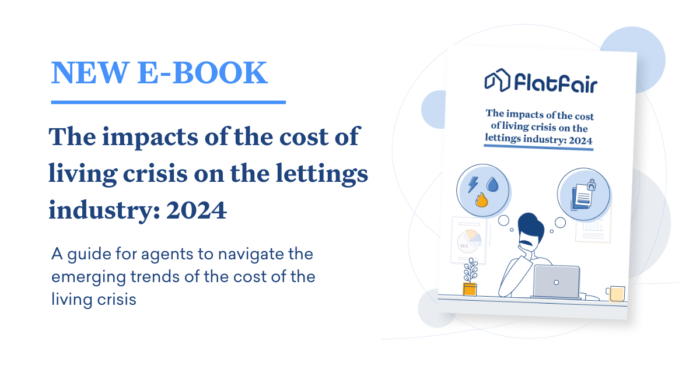Agents Apr 15, 2024 < 1 min read
E-BOOK: The impacts of the cost of living crisis on the lettings industry 2024
The escalating cost of living has rapidly and significantly impacted the UK lettings industry. Agents are working…

From our office window, the Shard looks almost touchable. There are people in the park below, and the City of London skyline rises up in the near distance. This is our working home at Uncommon, Borough. It’s an incredible space, full of incredible people. So incredible in fact, some of them took the time out to write about flatfair and our mission to make the future deposit-free. Here’s what they had to say…
Renting has never really been a smooth and simple experience. Many people living in big cities – where ‘buying property’ is nothing short of a mythical notion – will know this first hand. In fact, the very idea of a ‘smooth and simple’ renting experience will read like a contradiction for people who have experienced withheld deposits, huge upfront costs, and questionable landlords.
Franz Doerr, the CEO of proptech startup flatfair, was one of those people. Upon moving to London from Germany he found himself amidst the financial quandaries of the British renter: “When I moved from one property to another, my deposit was still tied up with the old property, but I had to come up with another deposit for the new property. It’s quite the pain point, especially around other costs of moving house.”
It’s an experience familiar to most renters, not just those in the capital. Deposits are expensive – usually amounting to “6 to 8 weeks of rent” – which only compounds the fundamental problem: raising enough cash to cover the cost of one deposit is difficult enough without having to raise enough cash for two. But the grievances aren’t just limited to the expense of a deposit alone.
“It took some time to educate both landlords and tenants that this is a great opportunity to give tenants more choice.”
Many have complained of it taking weeks to get their deposit back after the end of their tenancy, and even more are familiar with losing some or all of their deposit for questionable reasons. Add all of this together, and it comes as no surprise that so many renters struggle to make the transition between properties without seeking financial support. Understandably, Doerr says, upfront deposits are the “second biggest pain point of renting besides the high price of rent.”
If there’s anything we can all learn from the explosion of startups across the working landscape, it’s that every problem has a potential solution. Given any outdated system or arduous process, there will be a corresponding innovation that gives us an updated and more efficient alternative. With upfront rental deposits, flatfair is that alternative. “Instead of paying an expensive deposit, tenants pay flatfair an affordable membership fee and for any damages at the end of their tenancy,” Doerr says when tasked with outlining his business model in the simplest terms.
By replacing hefty deposit payments with a small membership fee equivalent to one week’s rent, flatfair works to lower a tenant’s upfront spend, improve the appeal of a landlord’s properties, and simplify the process of renting for everyone involved. This system also completely removes Doerr’s initial problem of having to account for two separate deposits in between tenancies; tenants can simply renew their affordable flatfair membership at the beginning of a new tenancy. “It’s about providing a pay as you leave plan rather than having all the costs upfront,” he says.
With similar deposit alternatives finding success in other European rental markets, he saw the opportunity to bring his more efficient concept to the UK. Unsurprisingly, this was no easy task, especially given how disruptive the company’s aims are against the backdrop of such a long-established renting model. “Tenants and deposits have been around for hundreds of years,” Doerr says, “so when we first started looking at this idea, people said: ‘Are you serious? This system has always been around, why would you change the way it has always been?’ It took some time to educate both landlords and tenants that this is a great opportunity to give tenants more choice.”
These initial reactions to flatfair speak for the general suspicion that surrounds disruptive ideas, or more specifically, the act of disrupting traditional systems by proposing more innovative ones. For instance, landlords might take comfort in the old deposit system as it works to secure their profit margins and protect their properties against damages. Without any significant incentive, they will be less likely to welcome innovations that change “the way it has always been.”
Of course, the deposit scheme does not exist solely to annoy renters. It has a practical function: to cover the costs of any property damage or financial loss caused by tenants during a lease. Do these protections still exist within a system that shuns deposits? Doerr says that they do: “Tenants are still liable for any charges after the tenancy, such as lawful claims and damages, and tenants are still protected through Independent Dispute Resolution as with the deposit schemes.”
“The deposit process is very paper based, but we are changing that with flatfair.”
But it’s not just about maintaining these protections. It’s also about making them more efficient. Previously, managing claims and disputes was a long and drawn-out process for both parties, involving reams of paperwork and manual processes. Doerr would be the first to admit this fact. “The deposit process is very paper based,” he claims, “but we are changing that with flatfair.”
“We have optimised the deboarding process by leveraging technology. Landlords can enter any charges through our web portal and tenants can respond to these to negotiate or dispute them. It gives transparency into what is being charged but also gives tenants a chance to respond, plus it helps to streamline the whole process.” In the event that tenants must pay for damages, they simply pay the charge upfront at the end of the tenancy instead of paying via a reduction of their deposit. This system is a great example of how, for the most part, the startups of today owe their new solutions to modern technologies – the likes of which were not available when insufficient solutions to those problems were the more prevalent ones.
(This post first appeared on the [Uncommon Journal]())

The escalating cost of living has rapidly and significantly impacted the UK lettings industry. Agents are working…

Deposit alternatives are becoming increasingly popular – in part due to the cost of living crisis. Tenants…